10 Best Accounting Software in the UAE for Businesses
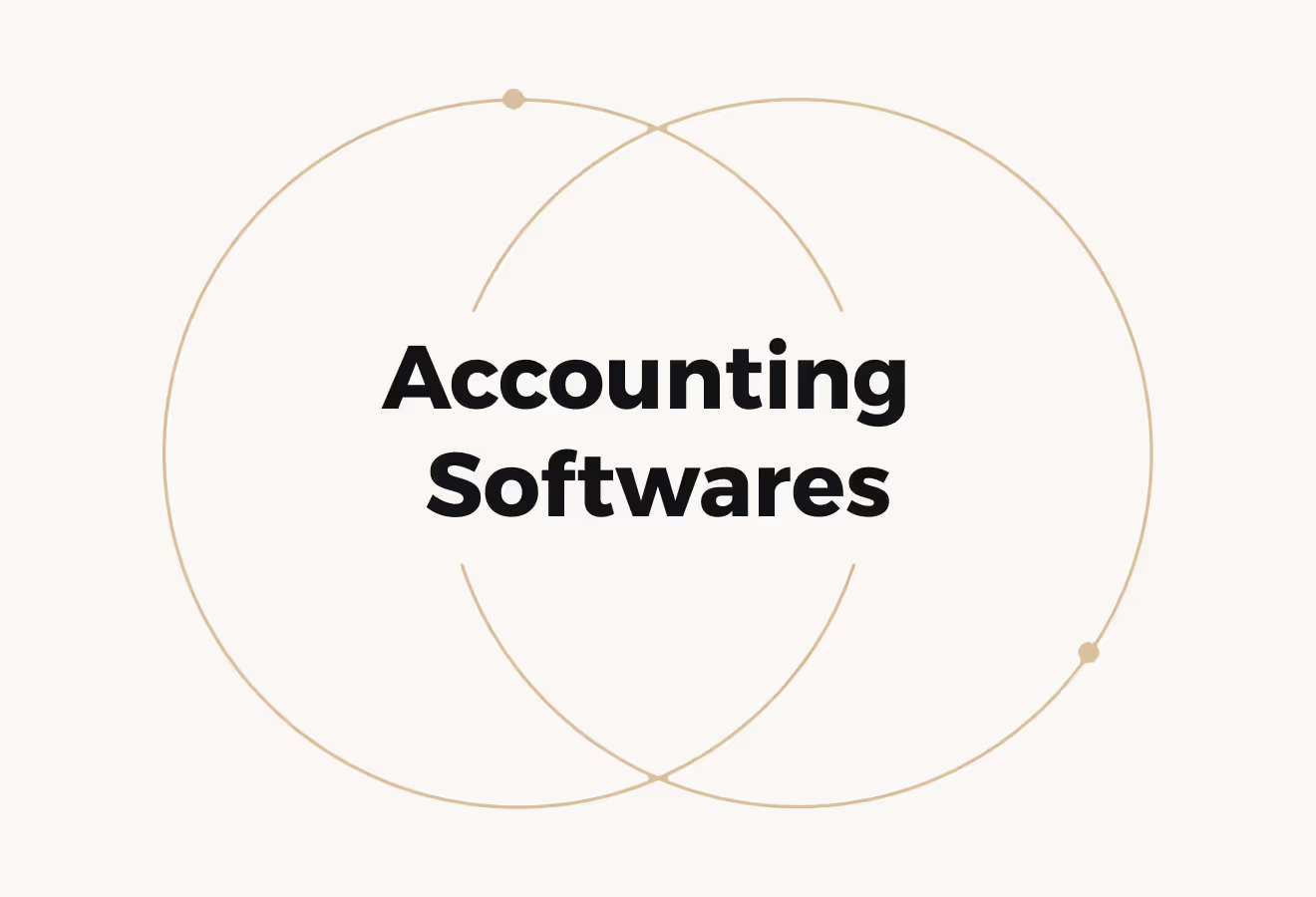
10 Best Accounting Software in the UAE for Businesses
Recruitment agencies in Dubai manage a wide range of responsibilities, from sourcing candidates to onboarding. Each of these responsibilities involves financial tasks that become more complex as the organisation expands. Hiring employees from different countries can pose challenges due to varying labour laws, currencies, and tax requirements. Accounting software can streamline the financial aspects of the hiring process. This article explores some of the best accounting software in the UAE to support timely and accurate payments to new hires.
While researching the best accounting software in the UAE, you may also consider Cercli’s global HR system to help stay organised. It helps streamline payroll for international hires by enabling accurate, timely payments across different locations.
Key Features to Look for in Accounting Software in the UAE

Since introducing Value Added Tax (VAT) in January 2018, businesses in the UAE are required to comply with strict VAT regulations, including accurate record-keeping, VAT calculations, and timely submissions.
Accounting software should support the following:
Automatic VAT Calculations
The software should calculate VAT on all eligible sales and purchases in line with the UAE’s standard 5% rate. This helps reduce the risk of errors or penalties.
VAT Report Generation
The software should generate reports that can be submitted directly to the Federal Tax Authority (FTA).
These must be formatted in line with:
- FTA guidelines and cover taxable
- Zero-rated
- Exempt supplies
E-Invoicing
With e-invoicing becoming increasingly important, especially in the UAE, the software should generate VAT-compliant electronic invoices that include required fields such as VAT registration numbers, accurate descriptions of goods or services, and correct VAT amounts.
The Importance of Multi-Currency Support in Accounting Software
As the UAE is home to many internationally active businesses, companies often work with clients and suppliers using various currencies.
Multi-currency support is therefore an important feature:
Currency Conversion
The software should offer real-time conversion using up-to-date exchange rates to maintain accurate records.
Invoicing and Reporting in Multiple Currencies
The software should allow businesses to issue invoices and track payments in different currencies, while maintaining records in the base currency (AED for UAE businesses).
Why Ease of Use Matters in Accounting Software
As many UAE businesses may not have in-house finance teams, ease of use is an essential factor when selecting accounting software.
Simple Interface
The software should have a straightforward, intuitive layout to allow users to manage daily tasks with minimal training.
Onboarding and Tutorials
Software should offer helpful resources such as video tutorials, guided setup tools, and customer support to help users get started.
The Role of Scalability in Accounting Software
As a business expands, its accounting software must be able to grow alongside it.
Additional Features
Payroll management, inventory tracking, and forecasting tools may become necessary as a business grows. Select software that includes these as add-ons or in higher-tier plans.
Customisation
Customisable reports and automated workflows can enhance efficiency as operations become more complex.
Cloud vs On-Premise Accounting Software: Key Differences
When selecting accounting software, businesses should consider whether a cloud-based or on-premise solution is better suited to their needs. Each option has its benefits and limitations.
Related Reading
10 Best Accounting Software in the UAE for Businesses
1. Cercli: Supporting HR and Payroll for Businesses in the UAE
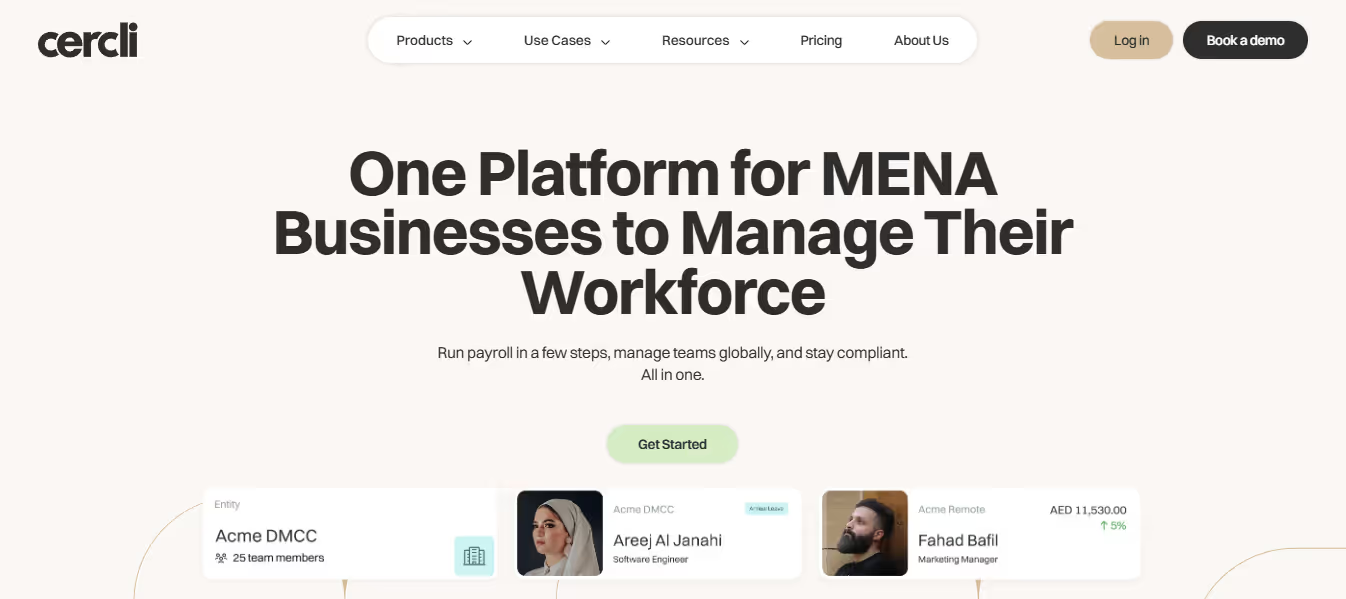
Cercli offers companies a practical way to manage HR and payroll tasks while ensuring compliance with local requirements. Built with the Middle East in mind, it supports businesses operating within the region as well as those managing international teams.
For organisations in the UAE, Cercli is designed to align with local labour laws. It enables HR teams to manage Wage Protection System (WPS) registrations, oversee DEWS contributions, and maintain employment contracts and benefits that meet statutory standards. This helps businesses remain compliant while focusing on their daily operations.
Simplifying Global Employment and HR with an Integrated System
Cercli also supports businesses with cross-border operations. It offers GOSI processing in Saudi Arabia and enables companies to manage global teams by facilitating payroll in over 150 countries. Its Employer of Record (EOR) services and compliant international contracts help reduce the complexity of hiring across borders.
Beyond payroll, Cercli consolidates HR processes into a single system. From onboarding and leave tracking to asset management and offboarding, it provides an efficient way to manage the employee lifecycle. This integrated approach can reduce payroll errors, minimise repetitive tasks, and improve internal coordination.
2. Zoho Books: Tailored for Small Businesses in the UAE
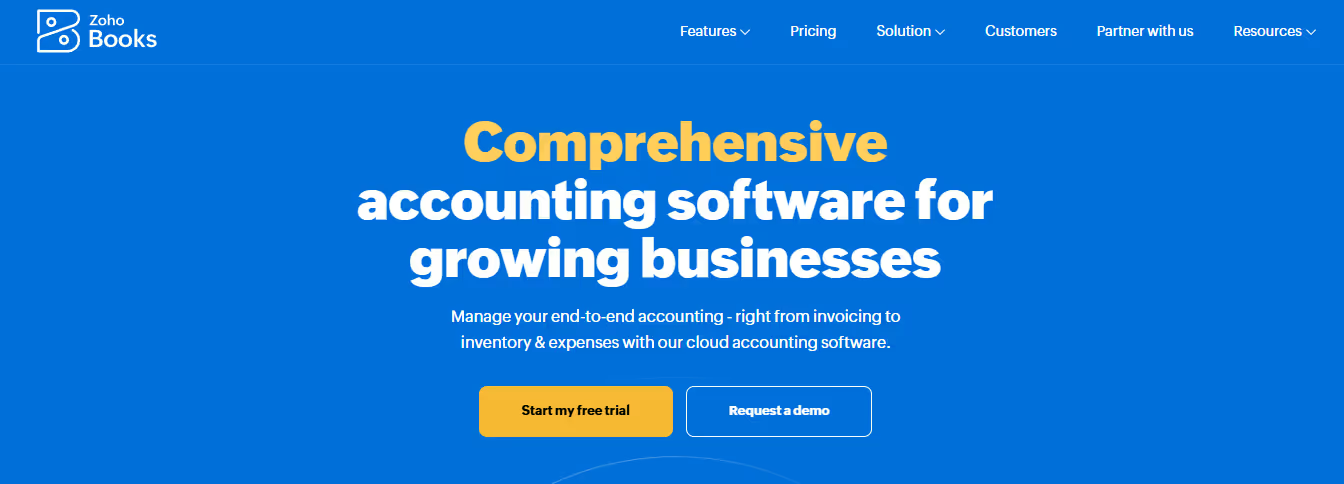
Zoho Books is a cost-effective accounting tool built with the UAE’s tax and compliance requirements in mind. It includes features for:
- Automated VAT filing and reporting
- Supports Arabic
- Offers a right-to-left layout option
This makes Zoho Books particularly suitable for small and mid-sized businesses that require local VAT compliance without investing in an overly complex system.
Its pricing is competitive, and the interface is user-friendly, especially for non-accountants. For UAE businesses that need essential accounting features, Zoho Books offers a practical solution without the overhead of global platforms.
3. QuickBooks Online: A Popular Choice Among UAE SMEs
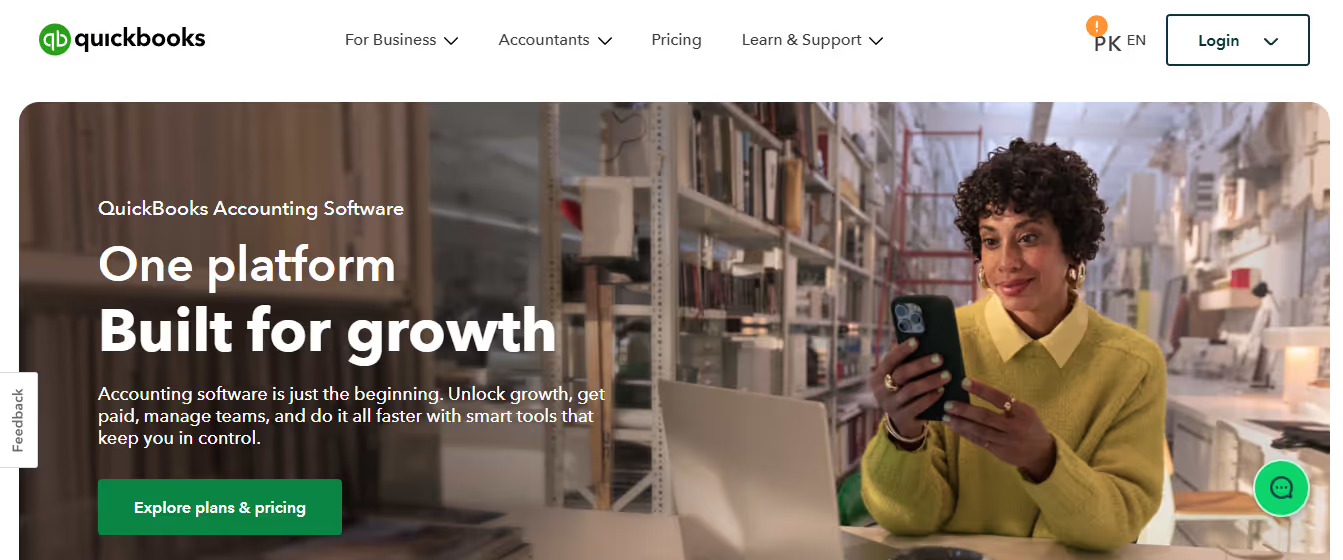
QuickBooks Online is widely used by small and medium businesses globally, and it is also well supported in the UAE. Many accountants in the region are familiar with the platform, making it easier for companies to collaborate with external professionals.
It offers a broad range of features, such as:
- Invoicing
- Expense tracking
- Multi-currency support
VAT configuration requires manual setup. Once correctly configured, it can meet UAE tax reporting needs. While QuickBooks Online is not designed specifically for the UAE, it remains a strong option for businesses that require flexibility and remote access.
4. Wafeq: Accounting Software Designed for the Gulf Region
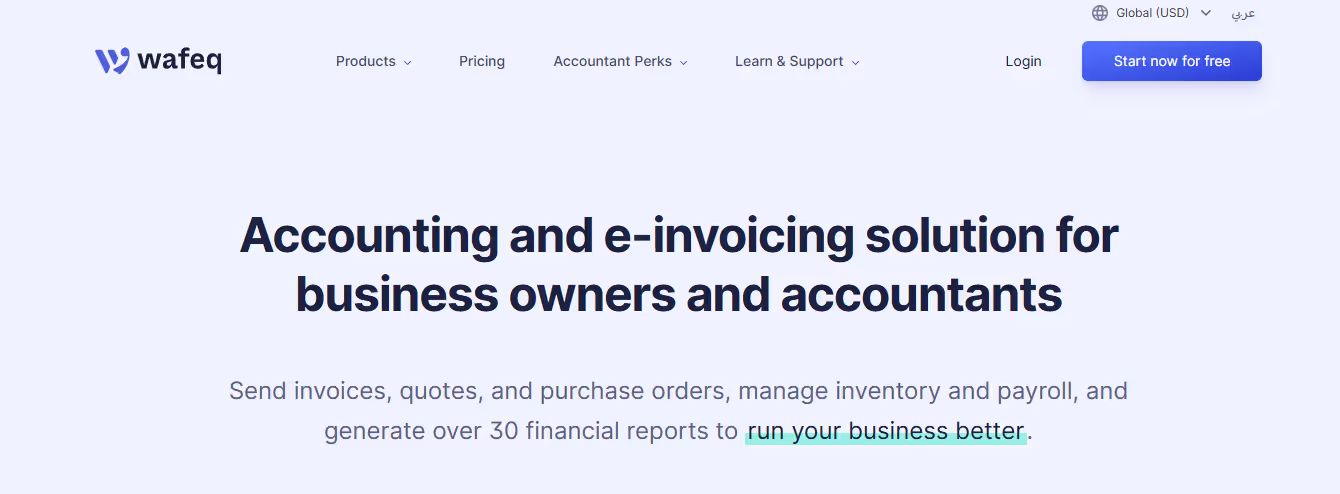
Wafeq is explicitly developed for businesses in the Gulf region, including the UAE. It offers native VAT and e-invoicing support, a bilingual interface, and customer service teams based in the area.
Its interface is modern and easy to use, with features such as:
- Automated bank reconciliation
- Real-time reporting
- Built-in audit trails
These are particularly useful for small to mid-sized businesses that prioritise compliance and accessibility. Wafeq’s local focus makes it well-suited for UAE businesses looking for a system that is both regionally compliant and straightforward to implement.
5. Xero: A Global Platform That Supports VAT and Cross-Border Work
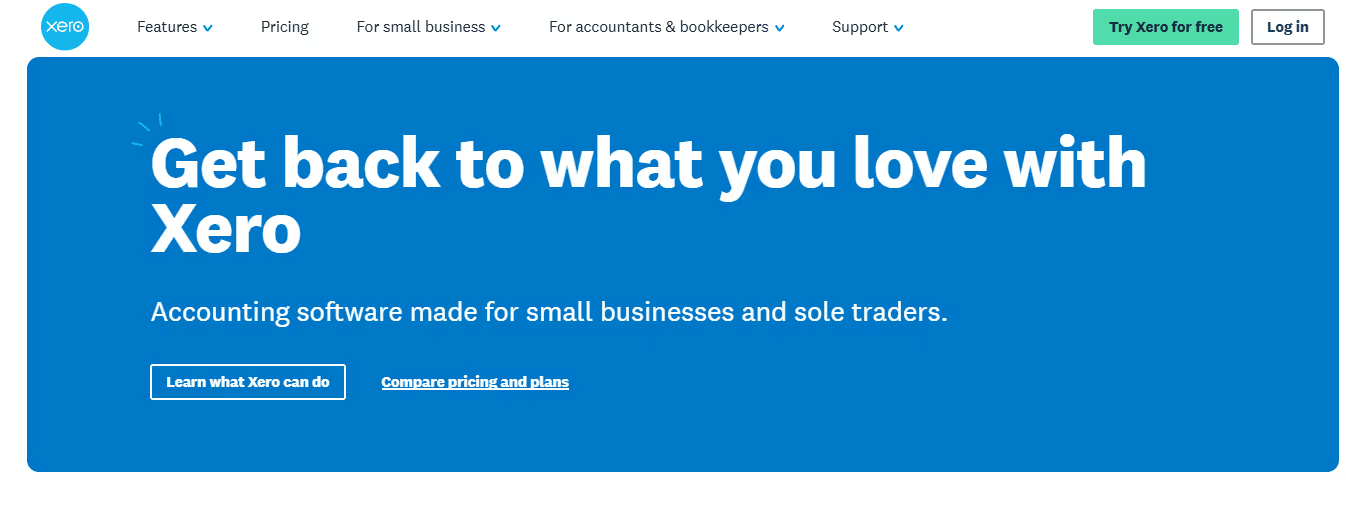
Xero is a cloud-based accounting software known for its modern design and ease of use. It supports VAT configuration, including UAE VAT codes, and is a good choice for companies that work with international clients or contractors.
Features such as customisable dashboards, bank feeds, and third-party integrations make Xero ideal for growing businesses that want to automate financial processes. While Xero is not explicitly developed for the UAE, it offers sufficient flexibility for companies comfortable with configuring their VAT settings and financial reports.
6. Sage Business Cloud Accounting: Designed for Basic Business Accounting
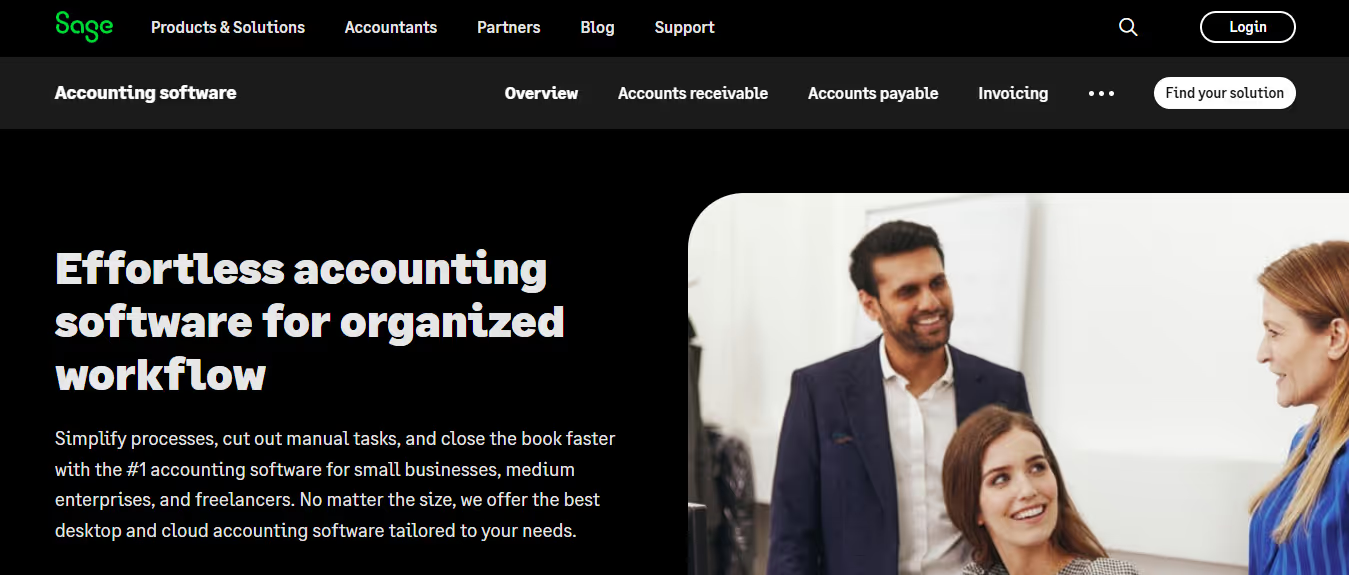
Sage offers a range of accounting tools, but its Business Cloud Accounting package is particularly suitable for small businesses in the UAE. It supports VAT, offers automated reporting, and focuses on core accounting features without unnecessary complexity.
Data is stored securely in the cloud, and backups are automatic. The system also includes invoice tracking, expense categorisation, and real-time dashboards to help owners stay on top of their finances. Sage provides a straightforward experience for businesses that want a reliable, compliant accounting solution without additional customisation needs.
7. TallyPrime: Accounting Software Favoured by Trading Firms in the UAE/
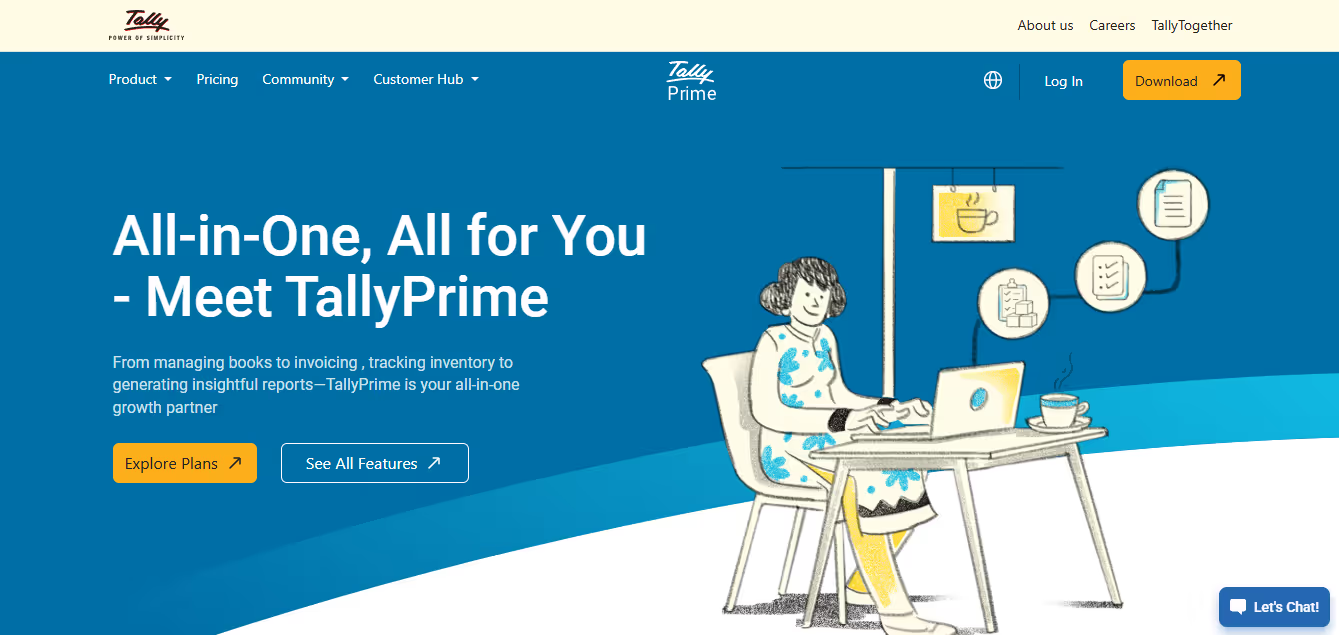
TallyPrime is a desktop-based accounting system commonly used by UAE-based:
- Wholesalers
- Distributors
- Trading companies
It is known for its strong inventory and cost centre tracking capabilities, making it suitable for businesses with high transaction volumes.
Although its interface is dated compared to modern SaaS tools, TallyPrime excels in delivering precise control over accounting functions. It also supports VAT compliance and provides detailed audit trails. For firms that prioritise local control over cloud access, TallyPrime offers a dependable solution.
8. FreshBooks: A Simple Option for Freelancers and Service Providers
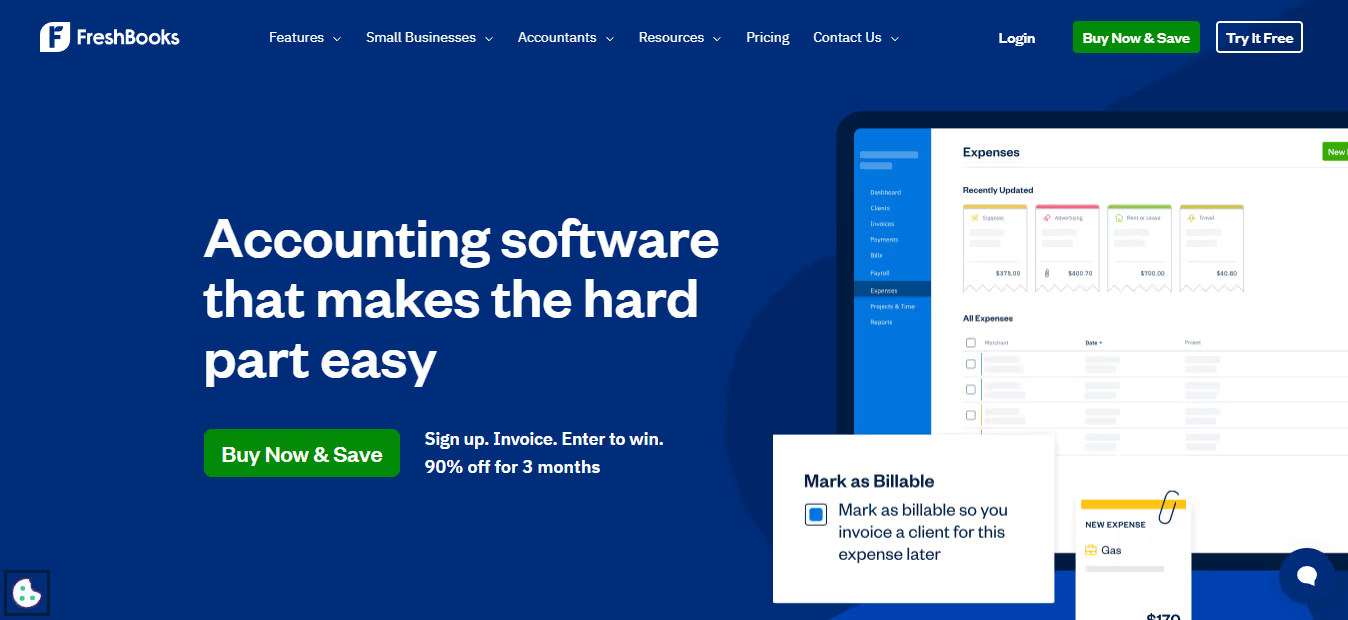
FreshBooks is designed for freelancers and small service-based businesses, particularly those billing by the hour.
It offers:
- Easy time tracking
- Client invoicing, expense logging, and online payment integration.
While FreshBooks is not built for UAE-specific regulations, VAT settings can be manually added. It’s best suited for sole traders and small agencies that need lightweight, intuitive accounting software.
Note: Customer support is based in North America, which may result in time zone delays for UAE-based users.
9. Odoo: Modular Software for Customised Business Management
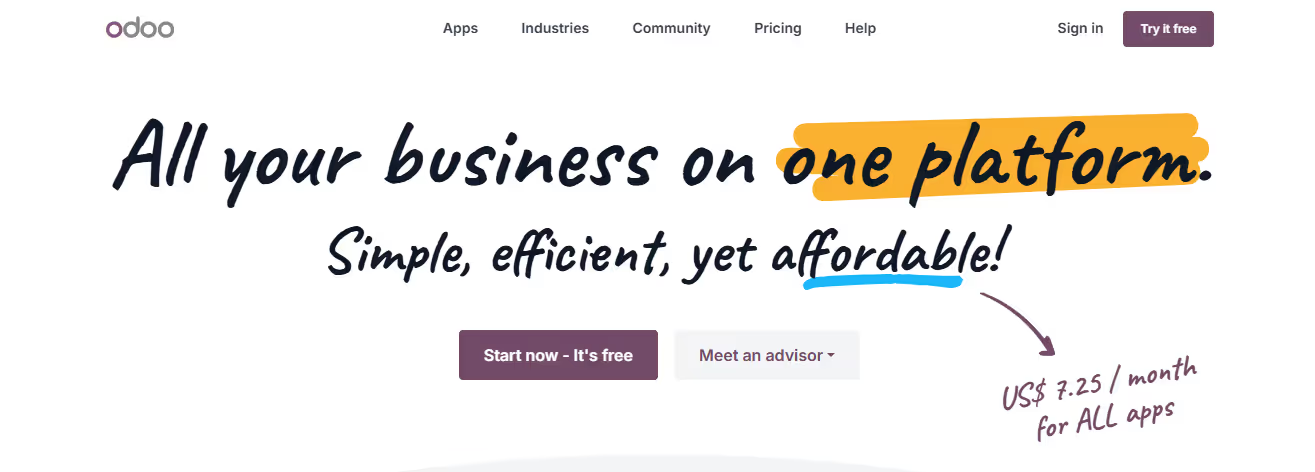
Odoo is an open-source ERP platform with a flexible accounting module. Its strength lies in its modular structure; you can customise the system to include inventory, CRM, payroll, and more.
In the UAE, Odoo partners offer localisation packages that include Arabic language support, WPS payroll features, and VAT-compliant invoicing. However, these require technical setup and often developer support. Odoo suits larger SMEs or businesses with unique workflows that can benefit from a tailored ERP system, rather than a ready-made solution.
10. Oracle NetSuite ERP: A Scalable Solution for Mid-Sized and Large UAE Companies
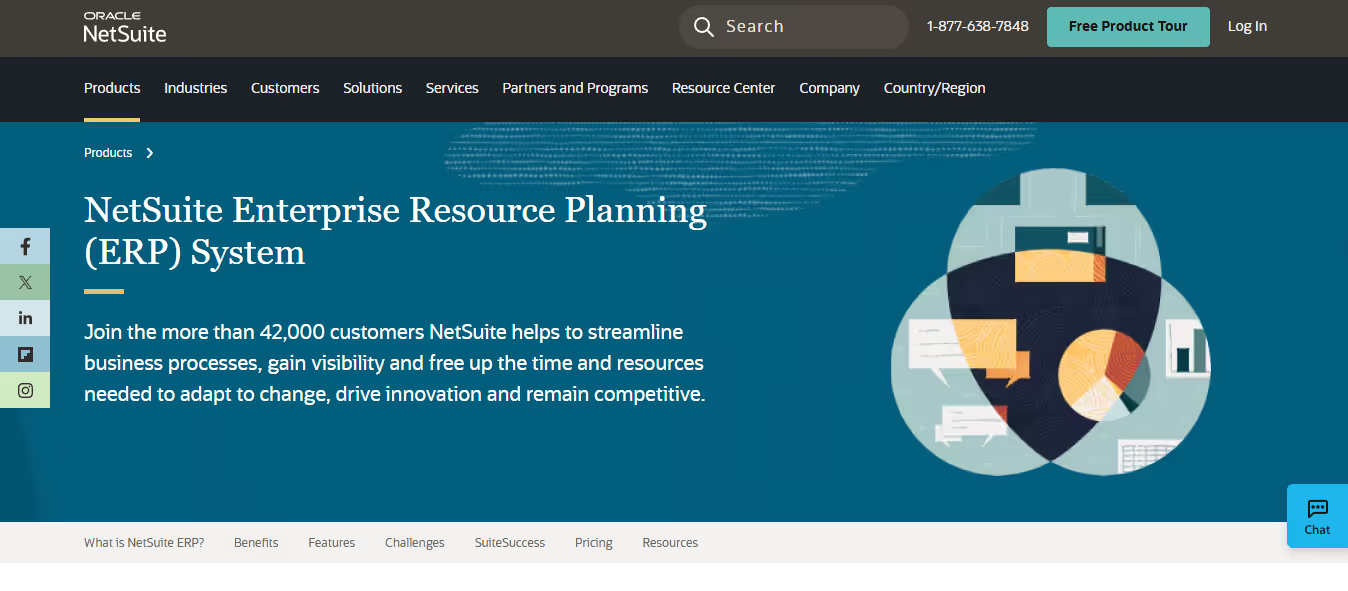
NetSuite is a full-featured ERP system used by mid-sized and large businesses across the UAE. It includes:
- Accounting
- Inventory
- Procurement
- CRM
It supports multi-currency and multi-country compliance, including UAE VAT, and can scale with businesses as they expand into new markets. NetSuite’s automation capabilities help streamline manual tasks and reporting. While it offers extensive functionality, implementation and licensing costs are higher than those of other platforms. It’s best suited for firms with complex operations and in-house financial teams.
Why Local Compliance is Crucial in the UAE

Operating a business in the UAE requires close adherence to local tax laws, which promote transparency, sound record-keeping, and the sustainable funding of public services.
Two key areas of compliance are:
- Value Added Tax (VAT)
- New Corporate Tax Regime
VAT Regulations Since 2018
VAT was introduced across the UAE on 1 January 2018 at a standard rate of 5%. Administered by the Federal Tax Authority (FTA), it provides a key source of revenue that helps fund public services such as healthcare, education, infrastructure, and public safety. It also supports the UAE’s efforts to broaden its revenue base and reduce reliance on oil and hydrocarbons.
Businesses must record all financial transactions accurately and maintain detailed records. Those meeting the minimum annual turnover threshold are required to register for VAT and submit regular filings. Even smaller firms are expected to keep updated financial records, allowing the FTA to assess whether VAT registration is necessary.
Corporate Tax and Record-Keeping Requirements
The introduction of Corporate Tax has further reinforced the need for accurate reporting and documentation. Businesses are expected to maintain clear records of revenue, expenses, and tax liabilities.
Robust record-keeping not only helps meet compliance requirements but also enhances financial oversight and supports strategic planning.
The Role of Automated Compliance
Accounting software with built-in compliance features offers practical support to businesses in the UAE. Automated tools can manage VAT calculations, generate accurate invoices, and simplify the preparation of FTA-compliant reports. This helps reduce errors and minimise the risk of penalties that could affect business continuity.
Adhering to local tax regulations helps businesses in the UAE maintain strong regulatory standing, operate efficiently, and support the country’s broader economic objectives.
Supporting Workforce Management in the Middle East and Beyond
Cercli supports companies in the Middle East that require a compliant and adaptable way to manage their workforce, whether teams are local, remote, or distributed across borders. Cercli is developed to reflect the specific needs of businesses in the region. It helps companies in the UAE, Saudi Arabia, and across MENA streamline HR operations, comply with local regulations, and manage payroll efficiently.
Cercli manages tasks such as WPS registrations in the UAE, GOSI processing in Saudi Arabia, DEWS contributions, and contract compliance, helping businesses handle regional payroll and HR requirements more easily. As companies expand their hiring to include remote employees, contractors, and international teams, Cercli supports global workforce management through compliant and structured solutions.
Supporting Cross-Border Teams with Efficient HR Operations
Companies can pay contractors or full-time employees in more than 150 countries using multicurrency payroll, Employer of Record (EOR) services, and legally compliant international contracts.
Cercli provides HR teams with a centralised system to manage key stages of the employee lifecycle, including:
- Onboarding
- Asset management
- Leave tracking
- Time-off calendars
- Payroll processing
- Offboarding
By consolidating employee data in one place, companies can reduce manual tasks, minimise payroll errors, and maintain apparent oversight of workforce activity.
Related Reading
Factors to Consider Before Choosing Accounting Software

Local Customer Support: An Important Factor for UAE Businesses
When choosing the right accounting software for UAE businesses, it’s essential to evaluate software vendors across several key areas. One of the key factors to consider is customer support.
Local customer support is essential for UAE businesses, as it helps ensure the timely and accurate resolution of issues, particularly when handling VAT compliance or regulatory matters.
Ensuring Accessibility Through Language and Learning Resources
Software that provides support in both Arabic and English is beneficial, allowing local businesses to communicate effectively.
Access to training resources is equally important. Look for vendors that provide tutorials, guides, and webinars, helping your team make full use of the software.
Security and Data Protection
In the UAE, data protection regulations are stringent, especially regarding sensitive financial information. Therefore, it's vital to choose software that complies with local laws, such as the UAE Data Protection Law.
Look for vendors that offer strong security features, such as:
- Encryption
- Two-factor authentication (2FA)
- Regular data backups
Reputation and Reviews
Before committing to any software, it’s advisable to assess the vendor’s reputation. Customer reviews, case studies, and testimonials from UAE businesses offer valuable insights into the software’s real-world performance.
Focus on feedback that highlights how the software supports:
- VAT compliance
- Scalability
- Ease of use
Cost Considerations
When selecting accounting software, it’s essential to understand the different pricing models available:
Subscription-Based Pricing
Most cloud-based accounting solutions, including Wafeq, operate on a subscription basis. This can be a practical option due to its lower upfront costs, and updates are typically included in the fee. Subscription pricing is also flexible, allowing businesses to adjust their plan as needed.
One-Time Payment
On-premise solutions may involve a single upfront cost, usually higher. This model may suit larger businesses with the capacity to invest in IT infrastructure and maintenance. Businesses are responsible for managing updates and security, which may require additional time and resources.
Choosing between these pricing models depends on your business’s size, cash flow, and operational needs.
Hidden Costs
Beyond standard pricing, businesses should be aware of potential hidden costs that may arise:
Additional Support Fees
Some vendors charge for advanced support or quicker response times. It’s essential to check what level of support is included.
Integration Fees
If the software needs to connect with tools like CRM systems or inventory software, there may be extra charges.
Upgrade and Maintenance Costs
For on-premise systems, businesses often bear the cost of upgrades and maintenance.
Training and Onboarding
It is also worth checking whether training or onboarding services incur additional charges. These services can support smoother adoption of the system.
Book a Demo to Speak with Our Team about Our Global HR System
Cercli is designed for companies in the Middle East to manage their workforce, whether local or spread across more than 150 countries, through a single platform. Cercli supports fully compliant payroll across the UAE, Saudi Arabia, and the wider MENA region. It also allows businesses to manage leave, oversee employee onboarding, track assets, and handle international contractor payments in multiple currencies.
Whether your business employs 25 people or is growing to more than 500 across several markets, Cercli provides a compliant system that supports both regional needs and international operations, helping your HR team manage payroll and workforce processes effectively.
Book a demo to learn how Cercli supports MENA-based companies in managing HR, payroll, and global teams while meeting compliance requirements across all markets.
Related Reading










